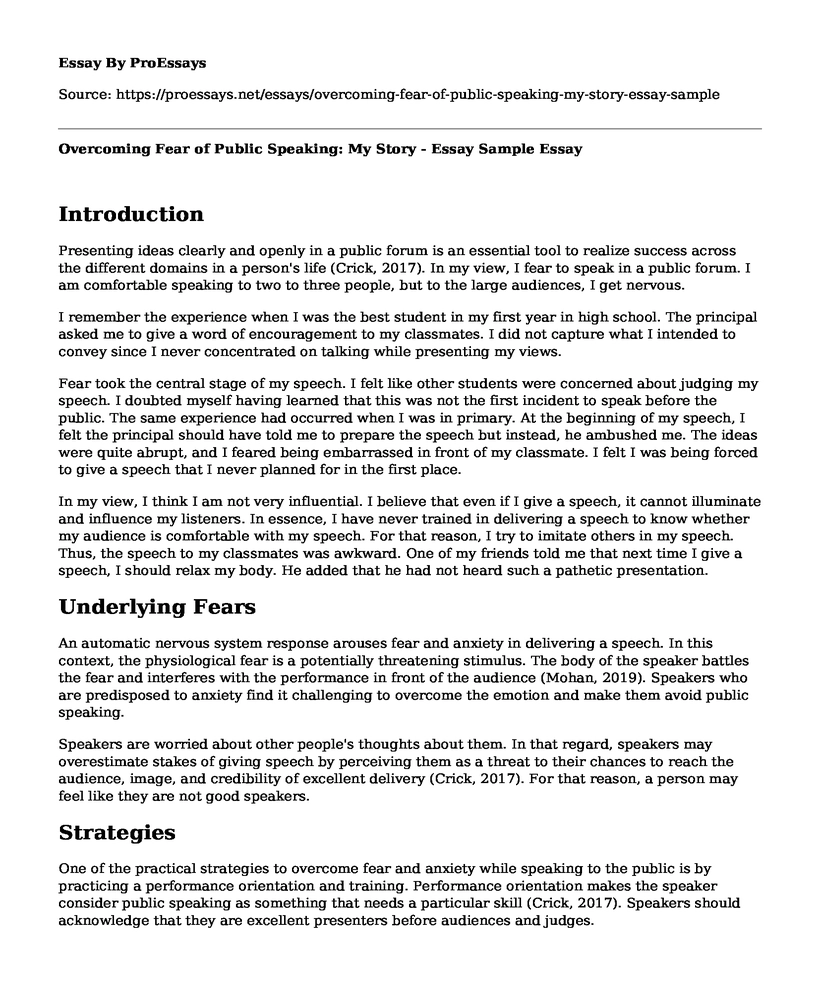Introduction
Presenting ideas clearly and openly in a public forum is an essential tool to realize success across the different domains in a person's life (Crick, 2017). In my view, I fear to speak in a public forum. I am comfortable speaking to two to three people, but to the large audiences, I get nervous.
I remember the experience when I was the best student in my first year in high school. The principal asked me to give a word of encouragement to my classmates. I did not capture what I intended to convey since I never concentrated on talking while presenting my views.
Fear took the central stage of my speech. I felt like other students were concerned about judging my speech. I doubted myself having learned that this was not the first incident to speak before the public. The same experience had occurred when I was in primary. At the beginning of my speech, I felt the principal should have told me to prepare the speech but instead, he ambushed me. The ideas were quite abrupt, and I feared being embarrassed in front of my classmate. I felt I was being forced to give a speech that I never planned for in the first place.
In my view, I think I am not very influential. I believe that even if I give a speech, it cannot illuminate and influence my listeners. In essence, I have never trained in delivering a speech to know whether my audience is comfortable with my speech. For that reason, I try to imitate others in my speech. Thus, the speech to my classmates was awkward. One of my friends told me that next time I give a speech, I should relax my body. He added that he had not heard such a pathetic presentation.
Underlying Fears
An automatic nervous system response arouses fear and anxiety in delivering a speech. In this context, the physiological fear is a potentially threatening stimulus. The body of the speaker battles the fear and interferes with the performance in front of the audience (Mohan, 2019). Speakers who are predisposed to anxiety find it challenging to overcome the emotion and make them avoid public speaking.
Speakers are worried about other people's thoughts about them. In that regard, speakers may overestimate stakes of giving speech by perceiving them as a threat to their chances to reach the audience, image, and credibility of excellent delivery (Crick, 2017). For that reason, a person may feel like they are not good speakers.
Strategies
One of the practical strategies to overcome fear and anxiety while speaking to the public is by practicing a performance orientation and training. Performance orientation makes the speaker consider public speaking as something that needs a particular skill (Crick, 2017). Speakers should acknowledge that they are excellent presenters before audiences and judges.
The other strategy is communication training, which helps a person to focus on telling the story, presenting information, and expressing ideas. The ultimate goal is to get through the listeners the same way speakers get through people in normal conversation (Mohan, 2019). A good speaker should take the same approach of everyday communication to public speaking.
Conclusion
In conclusion, anxiety and fear are greatly caused by status differences, degree of evaluation, new audiences, new ideas, and lack of experience. For a person to overcome anxiety and fear, there is a need to conduct performance and communication orientation. Therefore, personal skills are one way to conquer fear and anxiety in public speaking.
References
Crick, N. (2017). Genres of Public Speaking. Rhetorical Public Speaking, 25-46. doi:10.4324/9781315232522-2
Mohan, B. (2019). Classical theories of public speaking. Understanding Public Speaking, 24-34. doi:10.4324/9780429274176-3
Cite this page
Overcoming Fear of Public Speaking: My Story - Essay Sample. (2023, Mar 28). Retrieved from https://proessays.net/essays/overcoming-fear-of-public-speaking-my-story-essay-sample
If you are the original author of this essay and no longer wish to have it published on the ProEssays website, please click below to request its removal:
- Global Happiness
- Why I Am Interested in Being a Physician Assistant Essay
- Paper Example on Solution-Focused Therapy
- Essay Sample on Family Care of Mental Health
- Why Should We Care About Depression Disorder? Annotated Bibliography
- Essay Example on Mental Illness: Unfair Treatment and Stigma in Toni Morrison's Sula
- Essay Sample on Mindfulness: Beyond Assumptions - Exploring Its True Nature







